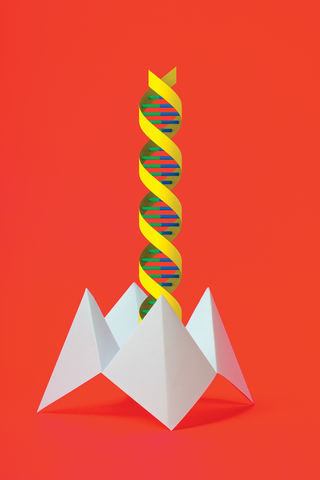What We Get Wrong About the Influence of Parents
Robert Plomin's new book explains why genes are the most powerful force shaping individuality.
By Matt Huston published November 6, 2018 - last reviewed on April 4, 2019

The secrets of the genome have a way of upending conventional wisdom, and behavioral geneticist Robert Plomin has scrutinized them for decades. Today, he explores how genetic profiles tilt us toward challenges and achievements. His new book, Blueprint, explains why genes are the most powerful force shaping individuality.
How has DNA research changed your understanding of mental health issues?
Twenty-five years ago, the genetic data were suggesting that everything is more-or-less rather than either-or. People are not either schizophrenic or not, autistic or not, alcoholic or not; everybody who works with patients knows there is a continuum. Now that we have polygenic scores—where thousands of DNA differences are aggregated into a score that maximally predicts an outcome such as schizophrenia or bipolar disorder—it’s obvious that all of these scores are normally distributed, which means that we all have genes associated with schizophrenia. It’s a question of how many we each have. That means that it’s not us versus them. It’s just us.
How far are we from gauging risk in a useful way?
Right now, for individuals, there is a wide margin of error. But if you take polygenic scores for schizophrenia and divide them into 10 equal groups, people in the top 10 percent have a 15-fold greater risk of being diagnosed than those in the bottom 10 percent. At the extremes and at the group level, there’s nothing else that predicts the diagnosis this strongly, and these scores will become more predictive. We can now better explain differences in national test scores in the U.K. based on genes than we could by knowing parents’ years of education. These are becoming our best predictors.
Are you concerned that children with low predictive scores might not receive the same support?
It will probably go the other way. I have a grandson who had some birth problems, so he couldn’t really speak intelligibly until he was almost 4 or 5 and had a great deal of difficulty reading. That doesn’t mean you give up on him, just that it’s going to take a huge amount of effort from his parents and grandparents. It paid off: He reads well enough now to read for pleasure. If parents realize that their kid has a low polygenic score for an outcome such as educational achievement, first of all, it’s probabilistic. In our study, of the kids with scores in the lowest 10 percent, about a third go to university; it doesn’t mean they can’t go. But does everyone have to go to university? I think kids have to love to learn, but I don’t know that you need to credential that with formal education.
What do we get wrong about the influence of parents?
What looks like the effects of the environment in which one grows up is often largely a reflection of genetic differences. For example, the best predictor of whether you’ll get divorced is whether your parents did, and people say, “Sure, if your parents were divorced, you had bad role models for married life.” But research with adoptees shows that your parents’ divorce would predict yours even if you were adopted at birth and raised in a different family.
Why can’t we give up the idea that parenting has the biggest effect?
The problem is that the environment is out there—you can see it and feel it—and you never see genetics. Parents can make a difference, obviously, to some extent. But if you’re having kids because you think they’re a block of clay to mold into what you want them to be, it’s really important to know that although you may be able to control their behavior, you’re not changing who they fundamentally are.
Facebook image: Lopolo/Shutterstock
LinkedIn image: Odua Images/Shutterstock
